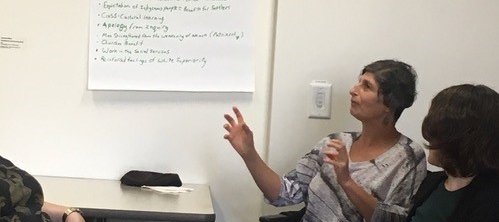Walking the Path to Reconciliation

Archives exist to preserve the full history of our province and Indigenous peoples are a crucial part of that story. The Saskatchewan Council for Archives and Archivists (SCAA) has been hard at work aligning their strategic direction and planning towards addressing the Truth and Reconciliation Commission’s (TRC) Calls to Action by ensuring the organization and its members have the capability to preserve this history, and are aware of the cultural significance of doing so.
Jeremy Mohr, president, SCAA, says, as the professional society and chief advocate for archives in Saskatchewan, he believes archives are all about preserving all of our history – both the good and bad -- and providing people access to these records. To those addressing reconciliation, these topics have become a crucial issue in the archiving profession.
Mohr says SCAA is working to champion reconciliation within the organization and encourage its individual and institutional members to follow suit.
“We recognize that it is often best that the history is accessed, reviewed, analyzed and curated by Indigenous peoples. They need more direct control over their own history,” he explains. “To help build that capacity we want to encourage Indigenous organizations to join our organization where we can more readily provide assistance to them. We have waived institutional membership fees for indigenous organizations.”
Mohr adds that SCAA recognized that its board as well as its members needed the tools to better understand reconciliation. SCAA has partnered with several organizations, such as the Saskatchewan Indigenous Cultural Centre, KAIROS and the Multicultural Council of Saskatchewan (MCoS), and created reconciliation workshops for SCAA’s members who work with Indigenous records, as well as First Nations and Métis peoples and communities.
“We want to equip members to better understand how to build working relations with Indigenous peoples, as well as to be aware of the cultural sensitivity that may exist in some of the records we keep,” he notes.
SCAA has also worked on addressing the TRC Calls to Action surrounding goals to ensure that Indigenous history is available to Indigenous communities, as well as promoting it to others in the spirit of fostering understanding.
According to Mohr, SCAA has tried to address this Calls to Action by encouraging its members to make their Indigenous records and collections more accessible. Furthermore, Mohr says, the organization prioritized diversity-related projects in its institutional grant program to help with these initiatives, such as funding a project for a tribal council to get shelving and boxes to safely store their records in order to get them off the ground.
“Our members are very interested in [reconciliation] as a whole and are looking for guidance on this topic. While we have had many people attend our workshops, we know more training is needed and certainly desired in the Saskatchewan archival community,” he adds.
Mohr adds that reconciliation is important for all Canadians to work towards. “If we don’t understand how we got to the point of needing reconciliation, we won’t be able to actually fix the problems of the past that continue to impact us now,” he explains. “I’m glad that SCAA members and archives across Canada are taking steps to make sure that we can help with reconciliation and work towards a better future for all of us.”
SCAA receives funding from Sask Lotteries.




